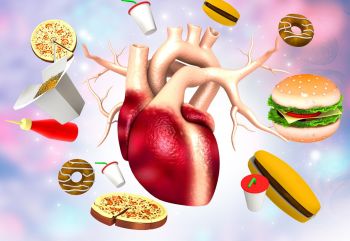THE RELATIONSHIP BETWEEN SLEEP AND NUTRITION by Nutrition Student, Rachel Davis
Posted on
Nowadays, we have so many demands on our time, juggling work, family and errands for example, that we often sacrifice sleep to fit everything in. How can diet affect our sleep patterns and how does sleep impact our diet? Third-year Nutrition student, Rachel Davis provides some answers.
With 75% of the UK population sleeping less than the recommended amount,1 sleep has become a growing public health concern, given that both short and poor sleep patterns are linked with a heightened risk of cardiometabolic diseases including obesity,2 type 2 diabetes and cardiovascular disease.3
 The vast majority of adults need between seven and eight hours of sleep a night for good health and cognitive function.4 However, different people need different amounts of sleep.
The vast majority of adults need between seven and eight hours of sleep a night for good health and cognitive function.4 However, different people need different amounts of sleep.
Sleep is an integral component of human health, allowing us to feel rested.5 I’m sure many of us notice how a bad night’s sleep or a late night affects us the next morning, whether that be your mood, cognitive ability, exercise levels, or hunger. I know when I’m tired, I tend to want to sit in front of the TV with a takeaway, instead of heading out for a walk and eating a home-cooked meal.
UNDERSTANDING YOUR BIOLOGICAL CLOCK
The body maintains a biological rhythm, which orchestrates your daily physiological functions, oscillating in cycles over 24 hours.6 Commonly termed your ‘body clock’, our circadian rhythm is controlled by both internal biological genetic components and external factors, including those in your environment, such as light and nutrition.7 Our bodies use the light of the day to translate information about the time of day into melatonin.8
WHY IS SLEEP IMPORTANT?
A good night’s sleep isn’t just about how many hours of sleep you get, but also the quality of sleep.
There are two types of essential sleep:
1 N-REM sleep (non-rapid eye movement sleep). This is composed of light and deep sleep stages and plays a role in boosting the immune system and physical repair of muscles, tissues and organs. It accounts for approximately 70% of your sleep cycle.9,10
2 REM sleep (rapid eye movement sleep). This accounts for 30% of the night’s sleep cycle and is important for psychological repair and memory processing. Most of our dreams occur in this stage and this phase is closest to wakefulness.11-13
There is convincing evidence that sleep quantity and quality affect human health. Inadequate sleep duration and quality have been associated with increased risk of cancer, cardiovascular disease, diabetes and all-cause mortality.14-16 Long-term sleep impairment has been related to Alzheimer’s disease and dementia.12,17 Within the context of behavioral factors affecting human health there is increasing evidence to suggest that diet and sleep may be related.4,18
 HOW SLEEP AFFECTS DIET
HOW SLEEP AFFECTS DIET
Short sleep duration and poor sleep quality have been associated with adverse dietary behaviours, including higher intakes of energy (kcals), fat and sugar, as well as lower intakes of foods shown to have health benefits, including vegetables, fruit and wholegrains. This reveals a potential mechanism underlying the relationship between sleep quality and cardiometabolic health.8,19,20
These dietary changes could be due to an increased opportunity to eat due to the added wake time to alterations in our appetite-regulating hormones: leptin (which effectively tells us how full we are) and ghrelin (which stimulates hunger, reward valuation of food and taste).9,21
Research has found that disturbing your sleep for just five nights can increase the activity in the reward regions of the brain, leading us to reach for more sweet and high-calorie foods.3,9,22,23 This can then lead to weight gain and negative health.
It’s also important to understand that small improvements in sleep can have a more positive effect on our diet. Increasing your sleep by just 1.5 to 2 hours per night for two weeks can reduce your appetite and your desire for sweet and salty foods.24
HOW DIET AFFECTS SLEEP
There is less research on the impact of dietary patterns and specific foods on sleep. We should generally eat our last meal three hours before bed, allowing our body enough time to digest properly.25,26 However, some foods are marketed as being ‘good for sleep’. Foods such as fruit, nuts and specifically cherries, strawberries and almonds are rich in melatonin, which can help aid sleep.24,27 A small amount of these can be helpful if you’re reaching for snacks close to going to bed.
Foods that play a negative role in sleep are those high in sugar, caffeine and alcohol.28 Caffeine has a quarter-life of 12 hours, essentially meaning that if you drink caffeine at 12pm, a quarter of the caffeine content will be in your system at midnight, leading to a disturbed night’s sleep.25
Alcohol, even though used as a way of winding down before sleep, actually disturbs your sleep cycle as it is metabolised in the body, especially disturbing critical REM sleep cycles.30 Similar to eating, if drinking alcohol, try to have three to four hours between your last drink and going to bed to still get a good night’s sleep.24
TAKE HOME MESSAGE
Sleep is an essential part of being human, allowing our bodies to rest and recover. However, the modern world running on a 24-hour clock interrupts our natural rhythm and it has a clear impact on other lifestyle factors including our diet. It is difficult to make recommendations for the average adult, as more studies are needed to show consistent associations between eating specific food groups and our sleep quality and quantity. Diet and sleep are also very individual – what may work for one person, may not work for another. Nevertheless, current evidence so far shows us that diet and sleep are pillars for overall good health and we should all be prioritising both if we wish to live long healthy lives.
Rachel Davis
Rachel is a third-year nutrition student with10 years of experience as a chef.
She is passionate about nutrition and interested in how we can all live
longer healthier lives through little lifestyle changes.
Instagram:@thelifestyledietchef
www.thelifestyledietchef.com
References
- YouGov (2022). Three Quarters of Brits Get Less than Eight Hours Sleep | YouGov [online] available from <https://yougov.co.uk/topics/health/articles-reports/2020/01/17/three-quarters-brits-get-less-eight-hours-sleep> [8 October 2022]
- Weihrauch-Blüher S, Schwarz P and Klusmann J-H (2019). Childhood Obesity: Increased Risk for Cardiometabolic Disease and Cancer in Adulthood. Metabolism 92, 147-152
- Bertisch SM, Pollock BD, Mittleman MA, Buysse DJ, Bazzano LA, Gottlieb DJ and Redline S (2018). Insomnia with Objective Short Sleep Duration and Risk of Incident Cardiovascular Disease and All-Cause Mortality: Sleep Heart Health Study. Sleep [online] 41 (6). available from <https://academic.oup.com/sleep/article/doi/10.1093/sleep/zsy047/4924334> [9 October 2022]
- Chattu, V., Manzar, Md., Kumary, S., Burman, D., Spence, D., and Pandi-Perumal, S. (2018) ‘The Global Problem of Insufficient Sleep and Its Serious Public Health Implications’. Healthcare 7 (1), 1
- Ben Simon, E., Vallat, R., Barnes, C.M., and Walker, M.P. (2020) ‘Sleep Loss and the Socio-Emotional Brain’. Trends in Cognitive Sciences 24 (6), 435–450
- Crnko, S., Du Pré, B.C., Sluijter, J.P.G., and Van Laake, L.W. (2019) ‘Circadian Rhythms and the Molecular Clock in Cardiovascular Biology and Disease’. Nature Reviews Cardiology 16 (7), 437–447
- Kim, Y.H. and Lazar, M.A. (2020) ‘Transcriptional Control of Circadian Rhythms and Metabolism: A Matter of Time and Space’. Endocrine Reviews 41 (5), 707–732
- Bi̇Ni̇Ci̇, H.İ. and Şat, İ. (2021) ‘Melatonin and Melatonin-Rich Foods’. Journal of the Institute of Science and Technology 2062–2068
- Duraccio, K.M., Zaugg, K., and Jensen, C.D. (2019) ‘Effects of Sleep Restriction on Food-Related Inhibitory Control and Reward in Adolescents’. Journal of Pediatric Psychology 44 (6), 692–702
- Patel, A.K., Reddy, V., and Araujo, J.F. (2022) ‘Physiology, Sleep Stages’. in StatPearls [online] Treasure Island (FL): StatPearls Publishing. available from <http://www.ncbi.nlm.nih.gov/books/NBK526132/> [8 October 2022]
- MacDonald, K.J. and Cote, K.A. (2021) ‘Contributions of Post-Learning REM and NREM Sleep to Memory Retrieval’. Sleep Medicine Reviews 59, 101453
- Irwin, M.R. and Vitiello, M.V. (2019) ‘Implications of Sleep Disturbance and Inflammation for Alzheimer’s Disease Dementia’. The Lancet Neurology 18 (3), 296–306
- Ruch, S. and Henke, K. (2020) ‘Learning During Sleep: A Dream Comes True?’ Trends in Cognitive Sciences 24 (3), 170–172
- Chaput, J.-P., Dutil, C., Featherstone, R., Ross, R., Giangregorio, L., Saunders, T.J., Janssen, I., Poitras, V.J., Kho, M.E., Ross-White, A., and Carrier, J. (2020) ‘Sleep Duration and Health in Adults: An Overview of Systematic Reviews’. Applied Physiology, Nutrition, and Metabolism 45 (10 (Suppl. 2)), S218–S231
- Garfield, V., Joshi, R., Garcia-Hernandez, J., Tillin, T., and Chaturvedi, N. (2019) ‘The Relationship between Sleep Quality and All-Cause, CVD and Cancer Mortality: The Southall and Brent REvisited Study (SABRE)’. Sleep Medicine 60, 230–235
- Ge, L., Guyatt, G., Tian, J., Pan, B., Chang, Y., Chen, Y., Li, H., Zhang, J., Li, Y., Ling, J., and Yang, K. (2019) ‘Insomnia and Risk of Mortality from All-Cause, Cardiovascular Disease, and Cancer: Systematic Review and Meta-Analysis of Prospective Cohort Studies’. Sleep Medicine Reviews 48, 101215
- Thomas, J., Overeem, S., and Claassen, J.A.H.R. (2019) ‘Long-Term Occupational Sleep Loss and Post-Retirement Cognitive Decline or Dementia’. Dementia and Geriatric Cognitive Disorders 48 (1–2), 105–112
- Krietsch, K.N., Chardon, M.L., Beebe, D.W., and Janicke, D.M. (2019) ‘Sleep and Weight-Related Factors in Youth: A Systematic Review of Recent Studies’. Sleep Medicine Reviews 46, 87–96
- Li, Jing, Yin, J., Luo, Y., Ma, T., He, L., Xie, H., Li, Jinchen, Zhang, G., Cheng, X., and Bai, Y. (2022) ‘Association of Healthy Sleep Pattern with the Risk of Cardiovascular Disease and All-Cause Mortality among People with Diabetes: A Prospective Cohort Study’. Diabetes Research and Clinical Practice 186, 109822
- Konttinen, H. (2020) ‘Emotional Eating and Obesity in Adults: The Role of Depression, Sleep and Genes’. Proceedings of the Nutrition Society 79 (3), 283–289
- Wilkinson, M.J., Manoogian, E.N.C., Zadourian, A., Lo, H., Fakhouri, S., Shoghi, A., Wang, X., Fleischer, J.G., Navlakha, S., Panda, S., and Taub, P.R. (2020) ‘Ten-Hour Time-Restricted Eating Reduces Weight, Blood Pressure, and Atherogenic Lipids in Patients with Metabolic Syndrome’. Cell Metabolism 31 (1), 92-104.e5
- Duraccio, K.M., Krietsch, K.N., Chardon, M.L., Van Dyk, T.R., and Beebe, D.W. (2019) ‘Poor Sleep and Adolescent Obesity Risk: A Narrative Review of Potential Mechanisms’. Adolescent Health, Medicine and Therapeutics 10, 117–130
- Yang, C.-L., Schnepp, J., and Tucker, R.M. (2019) ‘Increased Hunger, Food Cravings, Food Reward, and Portion Size Selection after Sleep Curtailment in Women Without Obesity’. Nutrients 11 (3), 663
- Du, C., Zan, M.C.H., Cho, M.J., Fenton, J.I., Hsiao, P.Y., Hsiao, R., Keaver, L., Lai, C.-C., Lee, H., Ludy, M.-J., Shen, W., Swee, W.C.S., Thrivikraman, J., Tseng, K.-W., Tseng, W.-C., Doak, S., Folk, S.Y.L., and Tucker, R.M. (2021) ‘The Effects of Sleep Quality and Resilience on Perceived Stress, Dietary Behaviors, and Alcohol Misuse: A Mediation-Moderation Analysis of Higher Education Students from Asia, Europe, and North America during the COVID-19 Pandemic’. Nutrients 13 (2), 442
- Chung, N., Bin, Y.S., Cistulli, P.A., and Chow, C.M. (2020) ‘Does the Proximity of Meals to Bedtime Influence the Sleep of Young Adults? A Cross-Sectional Survey of University Students’. International Journal of Environmental Research and Public Health 17 (8), 2677
- Min, C., Kim, H.-J., Park, I.-S., Park, B., Kim, J.-H., Sim, S., and Choi, H.G. (2018) ‘The Association between Sleep Duration, Sleep Quality, and Food Consumption in Adolescents: A Cross-Sectional Study Using the Korea Youth Risk Behavior Web-Based Survey’. BMJ Open 8 (7), e022848
- Mozsik, G. and Figler, M. (2019) Nutrition in Health and Disease: Our Challenges Now and Forthcoming Time. BoD – Books on Demand
- Scoditti, E., Tumolo, M.R., and Garbarino, S. (2022) ‘Mediterranean Diet on Sleep: A Health Alliance’. Nutrients 14 (14), 2998
- Shriane, A.E., Ferguson, S.A., Jay, S.M., and Vincent, G.E. (2020) ‘Sleep Hygiene in Shift Workers: A Systematic Literature Review’. Sleep Medicine Reviews 53, 101336
- He, S., Hasler, B.P., and Chakravorty, S. (2019) ‘Alcohol and Sleep-Related Problems’. Current Opinion in Psychology 30, 117–122
